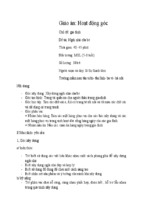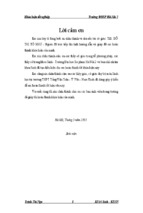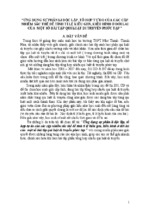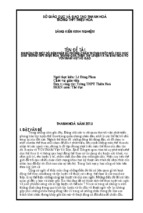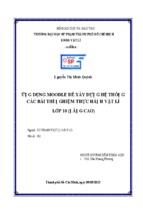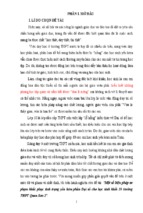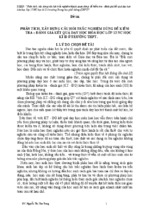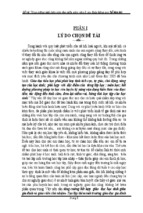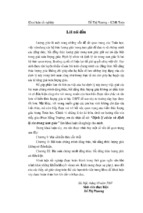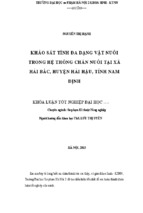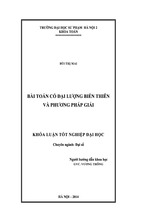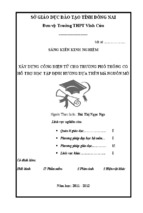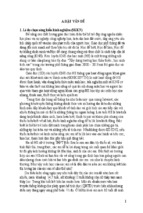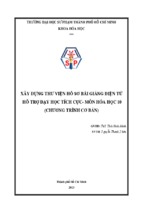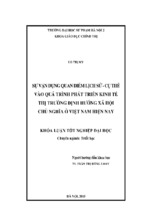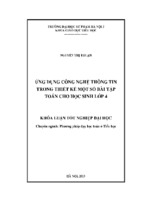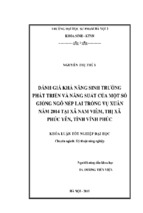II. Problems in pronunciation
1. The production of certain sounds and sound groups (clusters):
In general, the sounds and sound groups that often trouble us are/
/etc
Not nly are they difficult in initial positions but they are specially difficel in
final positions as well.
The reason is that such sounds do not exist in Asian languages and are,
therefore, a distinctive feature of English.
2. Sound linking: This also causes a lot of trouble because we do not often
link sounds in our language. We can always observe cases like: This is a matter
of course" or "she's a teacher of English".
Sound linking sometimes makes it impossible to understand even very short
and simple sentences: "What's that?" or "How much is it".
3. Stress, rhythm in tonation.
Vietnamese is a tone language. The strees usually depends on the tone of
each word. Spoken with different tones, one word may have entirely different
meanings:
(water) melon,
coconut,
pineappe, to lean...
"da
dõa,
døa,
dùa". On the contrary, an
English word usually retains its basic lexical meaning no matter what stress and
intonation it goes with:
..................
..................
..................
..................
..................
..................
pineapple
pineapple
pineapple
Unlike Vietnamese, English stress and intonation are so varied and
changeable. The same word might have the stress now on the first syllable, now
on the second (this will be dealt with later). The intonation is now like the take
off an aeroplane, now like the singing of birds, now "like the whispering of
leaves".
Apart from stress and intonation, rhythm is no less typical of English,
either.
As a matter of fact, English rhythm is very regular. The stressed words
behave fairly like notes in music. If they are close to each other, we have to slow
down. But when they are for apart we have to speed up".
English is, therefore, "admired and praised" as a languge spoken like music.
We think, it really deserves this compliment.
It goes without saying that the above – mentioned problems are the cause,
the source of mistakes for us. Typical mistakes are now presented as follows:
1. Omission of sounds.
a. Omission of/z, s/
As has been discussed, in many cases, English consonants at the end of
words must be pronounced but we often drop them, e.g: "My sister often gives
me nice presents". Our tendency here is to leave out/z/of "give" and/s/of
"presents" and say/
This mistake is more likely in "The building has got a large and beautiful
dining hall next to the conference hall".
When saying a long sentence like this, we are "vigilant" but when we can be
"vigilant" against the sounds in the first words we are very likely to forget some
in the last ones. Here we easily drop the / s/ of "conference" thus saying: "The
building has got a large and beautiful dinning hall next to the/ ......../hall".
Another cause of this mistake is that when we are up to "conference", our
tongue gets lazy and tired, that is why that "tiring sound" is dropped.
For this, I have drawwn out a rule: the sounds / z, s, ...., f, t.../are always
pronounced, no matter where they stand except in assimilation cases.
e.g: "Mary's shirt's nice but its colour's changed". Herre , we can see
that/z/in "Mary's shirts assimilated by/ .........../but all other/z, s/ sounds are
pronounced.
b. Omission of/t,k/before/1, s/etc.
Besides/z,s/, mistakes are also often made on dropping/t,k/when they go
before/1,s/:
Shortly, tightly, recently, modestly, honestly, outline, shirts, books, sticks
etc.
c. Omission of consonant groups.
Not only single consonants are dropped but groups of them are dropped as
well: "She often roasts meat." The kiosks are beautiful". Here/ts, ks 'are dropped.
The reason is that there is/s/before them.
2. Addition of sounds (redundancy)
Funnily enough, as opposed to omission there is addition. Some of us
pronounce so carefully that every sound comes out too clearly. Some common
mistakes are in "I''d like....; He asked me" etc. Some may even pronounce all
eding sounds in sentences like: "Last week the lazy student came at eight
o'clock".
If a fussy woman spoke like that she wouldn't be able to quarrel. When
fussy women quarrel they speak very quickly, do they?
Here we can work out a rule for standard pronunciation; It might be:
"The consonant sounds/t, d,k,m,n/etc. are nearly omitted in words final
positions (except in sound linking and special cases). Concerning our English
teaching on T.V, a few years ago, the English lady pronounced all ending sounds
(in a sentence) very clearly because this is just for the sake of teaching. In real
life, their sounds do not come out like that. In our opinion, for the third time she
should have produced them normally so that the learner wouldn't have been
affected by her exaggeration.
Besides consonants, we often add unnecessary vowels to such words as
"didn't, shorten, shouldn't, ordinary, interesting, history, clothes", "We might say/
'didant, 'odinari/ etc. while in standard rapid speech, they may glide very quickly
and sound strange to us: /'didn’t/ you go?
It would "torture" the English ear if we pronounced these sentences
wrongly: "I'm certain you didn't shorten the curtain" – Sure I didn't because that
curtain shouldn't be shortened but just widened".
The way to overcome this is to close our mouth and let the last syllable go
out of the nose.
3. Poor sound linking.
English people often link sounds even where there is no consonant before a
vowel: law and order.
The following sentences in rapid speech sound strange to us: "They are
there", "How much is it? "You're eight, aren't you? "Even among native
speakers, sometimes there is difficulty in understanding if the listener is not
attentive.
4. Poor stressing:
Stressing in English is extremely varied and typical mistakes are often seen
here.
Now respectively we will deal with both word stress and sentence stress.
a. Word stress:
As a rule, most of English words ending with - ish, - ist, - ice, - ness, etc.
usually have the main stress on the first syllable but we often stress both the first
and the last:
- Finish, polish, boyish, whitish, childish.
- Dentist, pianist, flutist, journalist.
- Practice, service, office, notice.
- Project, context, subject, object (nouns).
- Decade, climate, surface, accurate, untimate, decorate, tolerate.
Similarly, the words whose middle parts are: - us; - ist; - est; etc. also cause
mistakes.
Instead of the first, we stress the second syllable: "industry, modestly,
forestry, ministry".
The cause of these mistakes is that the syllables: - ist; - est; - ness; etc. look
similar to Vietnamese words having the rising (s¾c) tone.
It must also be noted here that some people who already know French
before they learn English are likely to put a heavy stress on the last syllable of
words like: "adjective, connective".
These mistakes on word stress are a big cause to the difficulties in our
listening comprehension especially when those syllables are pronounced with a
falling tune: "The whiteness is perfect" said the architect to the pianist".
Moreover, difficulty increases with compound words because the stress, in
many cases, is now on the first syllable now on the second depending on their
position. When they are attributes, it is on the first and moves to the second
when they are predicatives: "She has a snow - white face" "Her face is snow
white".
If we tress on the wrong way, a word may become a grpup of words and
vice versa thus leading to entirely different meanings. Even if there is a context,
we can hardly understand each other; e.g:
"Go and find him ther. He lisves near the'green house.
- But I can't see any' green house.
We can use mistakes to make up some jokes:
- Vietnamese friend (at a barbecue table).
Oh, there's ablue - bottle on the table.
- Australian friend (4 metres from the table):
Yes, I know. Why?
- Vietnamese friend:
Blue- bottles are dirty, you know.
- Australian friend (surprised and annoyed):
Nonsense! I've washed it care fuly.
- Vietnamese friend: (very surprised too): ??
6 - CONCLUSION.
English has been learnt and tought widely so far as it has been regarded as a
compulsory subject in the curriculum of schools and universities as well in
Vietnam. More and more Vietnamese learners ar fully aware of the importance
of the international language.
It is tru that learning English is not easy at all, but it is an interesting and
meaningful work. Finding it easy of difficult to learn English depends on the
learners' specific purposes. however, it is undeniable that English phonology is
very complicated. Most students of English often claim that English poses
considerable problems because it is so different from the Vietnamse laguage.
Therfore, it is very necessary for both teachers and students to be aware of
the differences of the two languages - English and Vietnamese and of the roots
of the problems so that they will find the appropriate solutions to the problems in
the process of studying and training. Also, it is very important for both teachers
and students to find their own shortcomings and errors they often make.
Hopefully, this resarch will be practically theoretical and a little bit useful to
both teachers and sutdents who are studying to become secondary school
teachers at Hong Duc Universtity. It is my hope that my little knowledge and
exprience will be suggestions for improvement for those who are intersested in
studying English.
- Xem thêm -


